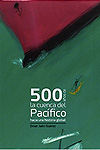Ruta de navegación
Menú de navegación
Blogs
Entries with label History of the Pacific .
[Omar Jaén Suárez, 500 years of the Pacific Basin. Towards a global history. Ediciones Doce Calles, Aranjuez 2016, 637 pages]
review / Emili J. Blasco
In just thirty years, between Columbus' arrival in America in 1492 and Elcano's return to Cadiz after his round-the-world voyage in 1522, Spain added to its domain not only a new continent, but also a new ocean. We all know about Spain's Atlantic dimension, but we often disregard its peaceful dimension. During the sixteenth and early seventeenth centuries, the Pacific Ocean was primarily under Spanish dominion. Spain was the European power present for the longest time and with the greatest weight in the entire basin of what began to be called the South Sea. Spain was the first navy that regularly patrolled its waters - the Armada del Sur, based in El Callao, Peru - and Spain was the first trade route that periodically crossed it from side to side - the Manila galleon, between the Philippines and Mexico.
 |
In "500 years of the Pacific Basin. Toward a global history", Panamanian diplomat and historian Omar Jaén Suárez does not limit himself to documenting that Spanish and then Hispanic presence in a vast space -one third of the Earth's sphere and half of its waters- whose eastern margin is the coast of Spanish America. As degree scroll indicates, his is a global history. But to approach the last half millennium means that it starts from the fact that the Spanish conquered the Pacific Ocean and that this is a global history. finding of the Pacific by the Spaniards and that determines the approach of the narration.
If Anglo-Saxon historiography would have perhaps used another prism, in this book the accent is placed on the development of the entire Pacific account from the arrival of the first Europeans, with Nuñez de Balboa at the head. Without forgetting the colonizing facts of other powers, the author details aspects that the Spanish do forget, such as the permanent base that Spain had in Formosa (today Taiwan), the attempts of the Crown to keep Tahiti or the voyages through Alaska in search of a sea passage to the north of America, which had as a logistic point the island of Quadra and Vancouver, the great Canadian city today known only by the second part of that name (in fact, Spain neglected to populate Oregon, more interested in the Philippines and trade with the Moluccas): quite a pioneering "turn to Asia").
Being from Panama gives Omar Jaén, who has also lived in Spain, a special sensitivity for his subject study. The Panamanian isthmus has always been the key to the South Sea for the Old World; with the construction of the canal, Panama is also a transit point between East and West.
The careful edition of this work adds an indisputable value. Almost eight hundred maps, graphs, engravings and photographs make it especially visual. The quantity of illustrations, many in full color, and the good weight of the paper make the volume thicker, in a printing that constitutes a luxury for anyone interested in the Pacific. Ediciones Doce Calles has taken great care with this first degree scroll of a new collection, Pictura Mundi, dedicated to celebrating travels, explorations and geographical discoveries.
